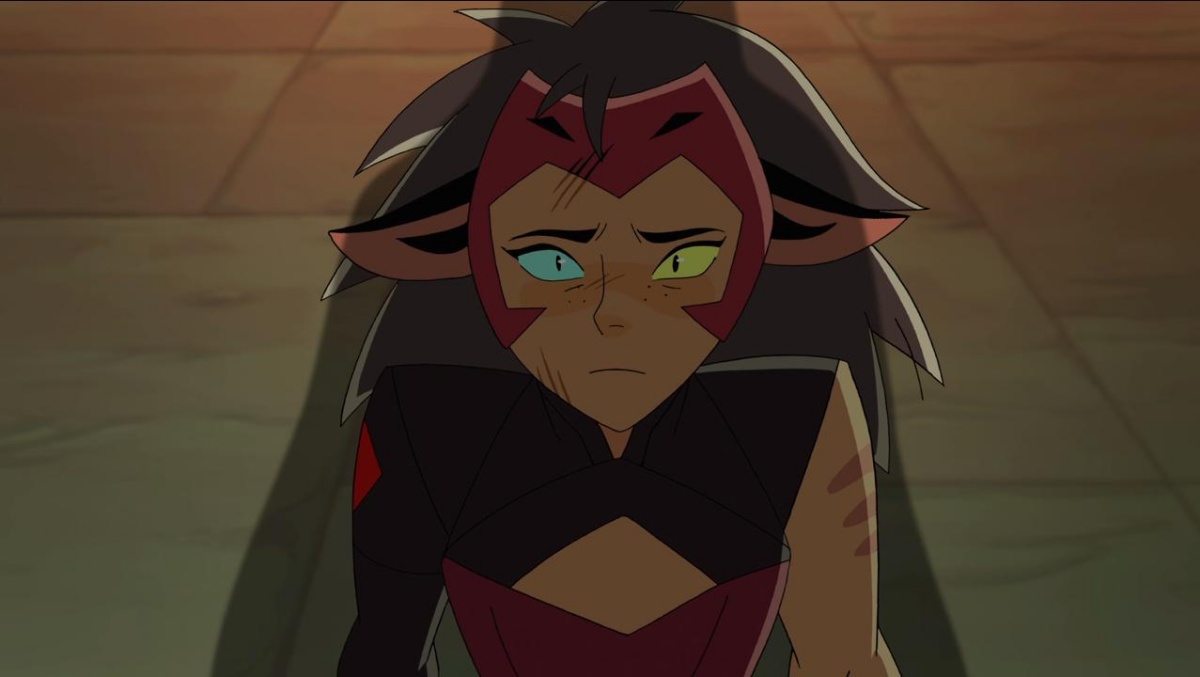Cartoon Teenagers Shouldn’t Be Held to Unrealistic Standards

As I’ve been rewatching Netflix and Noelle Stevenson’s She-Ra and the Princesses of Power in preparation for the newest season, and also scrolling through the internet, one of the things that keeps getting discussed is the prospect of a redemptive story for fan-favorite Catra.
Throughout the show, Catra has been a character who, as a result of her trauma, PTSD, and being raised as an emotionally starved child soldier, makes irrational, hurtful, cruel, and sometimes even evil decisions. However, in the discourse around Catra, I think we should all remember that the character in question isn’t some average human teenager or adult on a Freeform show; she is a severely abused teenager.
When I was a teenager, I remember reading the fifth Harry Potter books and completely loathing Harry for his emotional evisceration of Dumbledore after Sirius died. For me, it seemed melodramatic and over the top for a character who rarely had emotional outbursts like that. In fact, when I think about the moment I stopped liking Harry as a character, that is one of the moments I remember. It doesn’t help that the passage puts all of his dialogue in caps lock, which, in retrospect, seems like another Rowling red flag more than anything.
As an adult, however—someone who has had to work through emotional trauma and issues that I long ignored—I can see that Harry was reacting to the last bit of safety he felt in this world being taken from him, one of the few loving links between himself and his parents ripped away. Plus, Dumbledore could have handled things better. I was, as a teenager, expecting Harry to react like a grown-up, not as an emotionally abused teenager.
The character of Catra is someone who we’ve seen was emotionally abused by her maternal figure. As we go back, we see that Shadow Weaver explicitly harmed Catra in a way she did not do with the other freight zone kids. They also never, Adora included, seemed to do anything to help her get out of that situation.
I am not saying that Catra shouldn’t be held accountable or that she did not have abusive behaviors in her past, but I also think we should take in the fact that she has not been given the tools to grow in healthy ways. After reading that terrible Lilo & Stitch take, I realized that, while we have the language of social justice to call out fictional characters for abusive habits, the show has never, ever tried to make it seem like Catra’s actions are justified. They have never made her just a victim, and so, while we should absolutely hold her accountable, we shouldn’t forget that we are talking about a traumatized person.
Catra has the same amount of room to redeem herself as Zuko did on Avatar: The Last Airbender. Hell, you can argue that Zuko entered that series in an even more privileged place, because he at least had Iroh and his mother at one point. For Catra, when Adora left The Horde, it was as if her “Iroh” had left. When people say “Well, she has Scorpia,” I really don’t think they understand what it means to have a “starvation economy” mindset.
I first came across this term in the book The Ethical Slut, and the authors describe it as the belief that “our capacities for love, intimacy, and connection are finite, that there is never enough to go around, and that if you give some to one person, you must be taking some away from another.” They explain that you learn this from parents who never give a sufficient amount of attention—or, in Catra’s case, none at all. It leads you to believe that all love is cutthroat and it also makes you suspicious when people offer you love.
For Catra, when Scorpia arrives and wants to be friends, she has already lost her best friend to “the enemy,” and not only that, but Adora left because she just figured out the Horde was evil—not when Catra was being abused, but when two relative strangers showed her that. For someone who believes that love is finite and has experienced that, it is not, then, easy to lean on or believe in the love of another person. We sometimes want so badly for people to be healed and to grow that we forget that growth not only takes time, but it has to be fostered in the appropriate soil.
Especially if what you want is accountability, not punishment.
(image: Dreamworks Animation/Netflix)
Want more stories like this? Become a subscriber and support the site!
—The Mary Sue has a strict comment policy that forbids, but is not limited to, personal insults toward anyone, hate speech, and trolling.—
Have a tip we should know? tips@themarysue.com